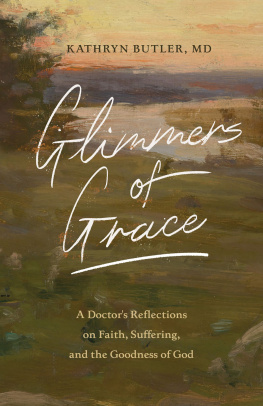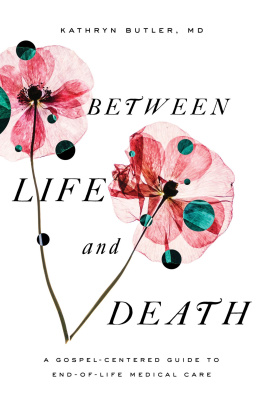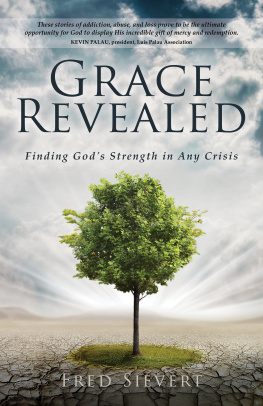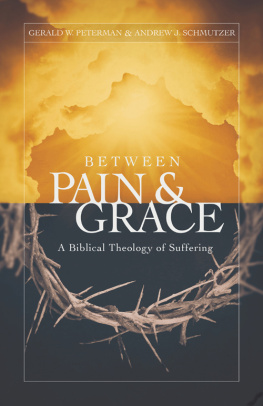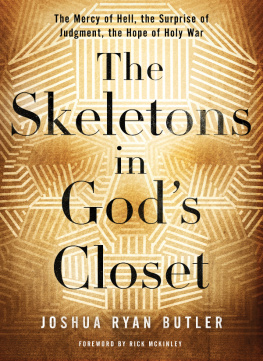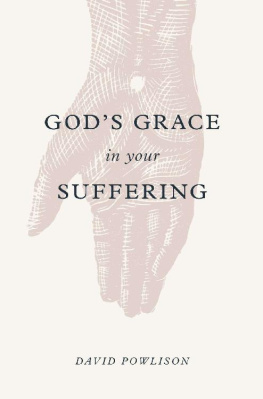Table of Contents
Landmarks
I knew that you are a gracious God and merciful, slow to anger and abounding in steadfast love, and relenting from disaster.
Jonah 4:2
He groaned with the lightest touch of his abdomen, which felt like a rock beneath my fingers. Stop! he growled. For a moment his glazed eyes locked with mine, and flashed with disdain.
I backpedaled and stammered an apology. As a naive medical student, I was eager to help, but loathe to overstep my boundaries. At the end of my shift in the ER, I mumbled an incoherent story to my supervising physician, and then skulked out of the hospital.
During my surgery rotation a few months later, a resident guided me through an exam of a patient with a perforated colon. When his abdomen, taut with infection, didnt yield beneath my fingers, the memory of the gentleman in the ER flooded back and stopped me cold.
I had missed peritonitis.
A disaster within the belly shocks the abdominal muscles into a rigid wall. As I recalled the patient in the ER, I realized that Id missed an infection oozing among his internal organs like a muddy river, leaching bacteria into his bloodstream every second. Without antibiotics and often emergency surgery, patients with peritonitis develop life-threatening sepsis.
In my ignorance, Id endangered someone in my care.
Never again , I vowed thereafter. Desperate not to harm someone with another mistake, for years afterward I obsessed over every data point. I awoke in the middle of the night to scour medical records from home. I checked and double-checked every order, every lab result, every turn of a clamp in the operating room.
Yet my compulsiveness couldnt redeem me. No matter how many people I returned home to their families, I was never able to sponge away the stain of my failures: my suture lines that didnt hold, the bleeding I couldnt stop, the infections that swept over wounds I had dressed. The teenage boy who cried, Help me! in the trauma bay, before dying with my hands around his heart. The girl who yelled, Youre hurting me! before a procedure I supervised went horribly wrong. I would awaken in the night, these cries echoing from a dream, and gasp for air. Lord, please forgive me , I would whisper, over, and over, and over.
All My Fault
My late-night awakenings are no anomaly. In the hospital, where the stakes are high and the outcomes grave, guilt and remorse are routine.
I remember the mother of a dying teenage girl. When the girls skin sallowed to mustard color, her mother would massage her hands with jasmine-scented lotion. When her eyes, vacant and bloodshot, darted around the room in delirium, her mother papered the walls with photographs to remind them both of what mattered.
The day this poor girl died, her mom climbed into the hospital bed with her. She wrapped her arms around her, enfolding her daughter in the same warmth shed known in her first moments on earth. As those of us in the ICU stood by, our hands helpless, our ideas run out, all we could do was bear witness to her grief. Abandoning any pretense of professionalism, we cried along with her.
The day before this tender scene, the mother crumpled into a chair and held her head in her hands. I keep begging God to take out my heart, to keep it from breaking, she said. But I dont even know if hes listening anymore. I put a hand on her shoulder, and felt her tremble. My family says this happened to her because I stopped going to church, she said, barely whispering. They say Gods punishing me. What if this is all my fault?
When the Guilt Overwhelms
Chances are high that you, too, have known deep remorse. The wages of sin is death (Rom. 6:23), and in the hospital, we toil in its preamble. Perhaps youre a loved one caring for the dying. As you cradle a mottled hand, do you wrestle with doubts? Do you wonder if youve made the right decision for your loved ones care? Do memories break through the sterility of the room and haunt you with words you should have said? Words you shouldnt have said?
Maybe you lie in a hospital bed and gaze at a bland ceiling. What worries taunt you? While you creep toward the threshold, do you glance back and grimace at the events leading you to this moment? Do you regret conversations, actions, or the way you looked at a loved one?
If youre a provider in the hospital, guilt likely constricts your heart like a vice. The threat of inadvertently hurting people stalks your thoughts. You take personal responsibility for the rise and fall of every data point, and yet patients die despite
Guilt so strangles us because, this side of the fall, we cant redeem ourselves. As Paul writes in Romans 7:19, For I do not do the good I want, but the evil I do not want is what I keep on doing. This problem of our sin nature snaps into sharp relief in the hospital, where grief and tragedy abound, yet where few converse in a language of atonement. We witness evil, cower from our guilt, and search the halls for forgiveness, but find only white coats, monitors, and more questions in the dark. We study our hands, scrub them, and cant scour away our errors. Unable to work out our own redemption, we bear the guilt.
Yet our Father is merciful and gracious, slow to anger and abounding in steadfast love (Ps. 103:8). While we groan under the heft of our remorse, we can also rejoice that Christ removes our transgressions from us as far as the east diverges from the west (Ps. 103:12).
God is holy. God will by no means clear the guilty (Ex. 34:7). He is just, perfect, and will not abide evil (Ps. 5:4).
Yet God is also merciful. And in his mercy, when we profess faith in his Son and confess our sins, he is faithful and just to forgive us our sins and to cleanse us from all unrighteousness (1 John 1:9).
A Gracious God and Merciful
The book of Jonah is a spectacular revelation of Gods mercy. I love to teach Jonah to young adults, who after a sticky sweet diet of cartoonish Bibles are surprised to learn theres so much more to this story than a big fish. As they dive into the text with mature eyes, Gods mercytoward Jonah, toward the sailors, toward the Ninevites, toward us sings from the pages.
Among prophets in the Bible, Jonah was delinquent. God commissioned him to preach the word to the people, for their good and the Lords glory. Obedience to God should have been a given. Yet when God called upon Jonah to preach repentance to the Ninevites, an enemy people, he ran from God. He fled to Tarshish, 2,500 miles across the Mediterranean Sea, in the exact opposite direction of Nineveh.
This was utter tomfoolery. As a prophet, Jonah would have been well versed in the Law and the Psalms, all which clearly teach that no one can hide from God: Where shall I go from your Spirit? / Or where can I flee from your presence? / If I ascend to heaven, you are there! / If I make my bed in Sheol, you are there! (Ps. 139:78 ).
Jonahs problem, as is so often the case, was idolatry. We learn in 2 Kings 14 that Jonah was a patriot who played a key role in the expansion of Israels territory (2 Kings 14:25). On the ship to Tarshish, he identified himself first and foremost by his heritage, and then only secondarily by his relationship to God: I am a Hebrew, and I fear the L ord , the God of heaven, who made the sea and the dry land (Jonah 1:9). Swollen with national pride, Jonah fled from God because he decided the Ninevites didnt deserve a chance to repent. He relished vengeance more than Gods wisdom and mercy.
The Ninevites were a brutal people who tortured and enslaved captives of war. Jonah was right: they didnt deserve forgiveness. But then, neither did Jonah . His brazen defiance placed him squarely under Gods wrath. We see as the story unfolds that God extended mercy to both these undeserving parties.
God sent a storm to thwart Jonahs retreat. Jonah, rather than repent, hid below deck and fell asleep, endangering the lives of the entire crew. The text tells us that in the midst of the tempest, the ship threatened to break up (Jonah 1:4). Threatened to , but didnt. God commanded the gale to stop the ship, but not destroy it. Out of mercy.

